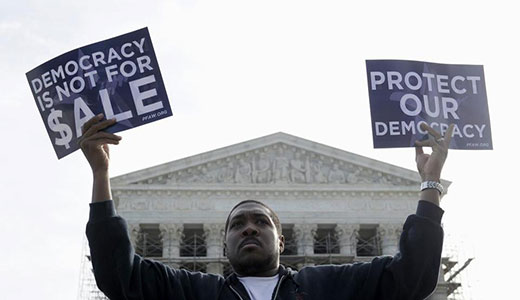
In its ruling announced today in the case of McCutcheon v. Federal Election Commission, the Supreme Court struck down limits on overall contributions to political parties and candidates.
Contributors must still abide by limits on how much money they can give directly to any one candidate in a two-year election cycle. However, they can now make that same maximum donation to as many candidates as they wish.
The McCutcheon decision extends and consolidates the victory won by the 1 percent in the infamous Citizens United decision. It marks a new phase in their brutal attack on the basic rights of working people, especially women, people of color, and immigrants.
What happened?
Shaun McCutcheon is an Alabama businessman with a history of financial support for ultra-right candidates. In 2011 and 2012, he donated money to 16 Republican candidates at the federal level. He wanted to donate to 12 additional candidates but could not because of limits on aggregate contributions in a given electoral cycle.
McCutcheon brought suit in federal court, saying that the aggregate limits on contributions violated his First Amendment rights, notably free speech and free association.
The District Court dismissed the suit and McCutcheon appealed to the Supreme Court, which heard oral arguments on October 8, 2013. On April 2, the high court handed down a 5-4 decision in favor of McCutcheon, saying:
“The government may no more restrict how many candidates a donor may support, than it may restrict how many candidates a newspaper can endorse… To require one person to contribute at lower levels because he wants to support more candidates or causes is to penalize that individual from ‘robustly exercising’ his First Amendment rights.”
Freedom of speech… for whom?
The McCutcheon v. FEC decision is the latest version of the ultra-right’s usual ploy, taking a deeply reactionary decision and cloaking it in the language of freedom.
It relies on the undemocratic idea that money is a form of protected political speech, a legitimate way of participating in the political process.
It turns a blind eye to the fact that the vast majority of voters can only speak in words and actions. To most of us, cash is a foreign language-and not one we’re likely to learn.
Chief Justice John Roberts explained the ruling in these words from the bench:
“If the First Amendment protects… funeral protests and Nazi parades – despite the profound offense such spectacles cause – it surely protects political campaign speech despite popular opposition.”
His words sum up blatant anti-democratic thrust of the McCutcheon decision: just as we protect virulent homophobia and open fascism, we must protect the wealthy few from “popular opposition.”
Storm clouds of the perfect storm
As dangerous as the McCutcheon decision is in isolation, it is only one piece of a much larger onslaught against the democratic institutions of the working class.
Since the Citizens United decision, which recognized corporate political spending as protected speech, labor unions have been the only organizations with the resources to make significant contributions, on behalf of their members, to candidates who support the working class.
However, several recent and pending developments hamstring labor in its fight to protect working people.
Scott Walker’s successful attack on public-sector workers in Wisconsin has provided a template for similar measures in other states and launched Walker as a contender for the Republican presidential nomination.
Right-to-work laws, which prevent labor unions from collecting dues, have now reached north into Indiana and even into a labor stronghold like Michigan.
Finally, the McCutcheon decision suggests how the Supreme Court will rule in Harris v. Quinn, a pending labor case.
In ruling on Harris v. Quinn, the justices will decide whether unions may continue to collect “fair share” payments from non-members covered under a contract. As the name suggests, these payments represent an employee’s “fair share” of the cost of negotiating and executing a contract with an employer.
If the Supreme Court rules in favor of the appellant, as seems probable, organizations like the Chicago Teachers Union will have to provide services for free to employees who choose not to join or pay dues… a further drain on our collective resources.
Together, these developments represent a concerted attempt to defund organized labor and lock the working class out of the American political process.
They pave the way for an ultra-right lockdown on government at all levels, which will mean:
- the intensification of campaigns to privatize and deregulate every aspect of our economy;
- deep cuts to social welfare programs like Head Start, Medicaid, and Social Security;
- acceleration of fossil fuel extraction and global climate change; and
- an escalation of the war on women, immigrants, people of color, and LGBTQ people.
In the elections of 2014 and 2016, the working class is fighting for its survival. We have always known that we can’t outspend the 1 percent … so we have no choice but to out-organize, out-phone bank, out-canvass, out-picket, and out-rally them.
The 1 percent will lock us into feudal serfdom if they can. Solidarity is our only defense; concerted action is our only weapon.
Photo: Cornell Woolridge of Windsor Mill, Md., took part in a demonstration in October last year outside the Supreme Court as the justices heard arguments on campaign finance. (AP)

MOST POPULAR TODAY

‘Warning! This product supports genocide’: Michigan group aims to educate consumers

Stalin, Zhdanov, Prokofiev, and Shostakovich star in ‘Stalin’s Master Class’


Bad investment: Ohio county treasurer sinks public money into Israeli government bonds

After months of denial, U.S. admits to running Ukraine biolabs






Comments